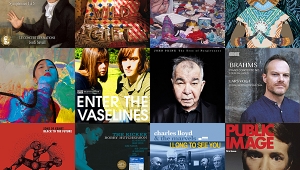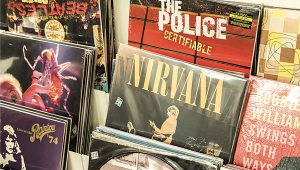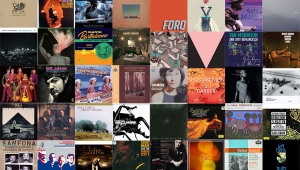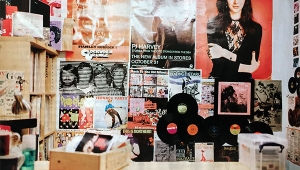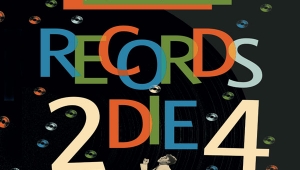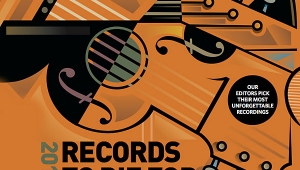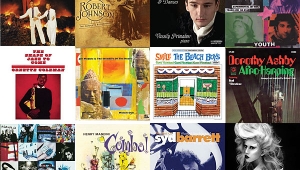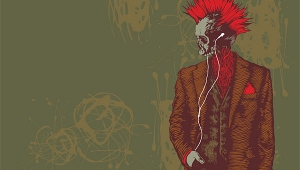| Columns Retired Columns & Blogs |
2009 Records To Die For Page 2
JOHN ATKINSON
 J.S. BACH: St. Matthew Passion, BWV 244 (Last Performing Version, ca 1742)
J.S. BACH: St. Matthew Passion, BWV 244 (Last Performing Version, ca 1742)
Nicholas Mulroy, Evangelist; Matthew Brook, Jesus; Susan Hamilton, Cecilia Osmond, sopranos; Clare Wilkinson, Annie Gill, altos; Malcolm Bennett, tenor; Brian Bannatyne-Scott, bass; Dunedin Consort & Players; John Butt, dir., harpsichord continuo
Linn CKD 313 (multichannel/2-channel SACD/HDCD CD). 2008. Also available as 88.2kHz/24-bit "Studio Master" (WMA, FLAC), 44.1/16 "CD Quality" (WMA, FLAC), and 320kbps MP3 files. Philip Hobbs, prod., eng.; Julia Thomas at Finesplice Ltd., post-prod. DDD. TT: 2:41:00
 J.S. BACH: St. Matthew Passion, BWV 244 (Last Performing Version, ca 1742)
J.S. BACH: St. Matthew Passion, BWV 244 (Last Performing Version, ca 1742)Nicholas Mulroy, Evangelist; Matthew Brook, Jesus; Susan Hamilton, Cecilia Osmond, sopranos; Clare Wilkinson, Annie Gill, altos; Malcolm Bennett, tenor; Brian Bannatyne-Scott, bass; Dunedin Consort & Players; John Butt, dir., harpsichord continuo
Linn CKD 313 (multichannel/2-channel SACD/HDCD CD). 2008. Also available as 88.2kHz/24-bit "Studio Master" (WMA, FLAC), 44.1/16 "CD Quality" (WMA, FLAC), and 320kbps MP3 files. Philip Hobbs, prod., eng.; Julia Thomas at Finesplice Ltd., post-prod. DDD. TT: 2:41:00
From the stately dotted ostinato of the opening chorale and its dark-hued baroque oboes, which sets the stage for almost three hours of music, this performance of the Christian Passion story grips you by the ears. The use of eight solo voices rather than a conventional double choir emphasizes the drama of the narrative, sacrificing lushness for clarity of line—an admirable tradeoff, in my opinion. Recorded by Linn's longtime tonmeister Philip Hobbs at Greyfriars Kirk in Edinburgh, the sound is immediate without being bright, rich without being muddy, close but with a dome of ambience readily discernible around and behind the singers. I list the disc catalog numbers in the heading, but I entered the 21st century by actually downloading this recording as high-resolution, two-channel, FLAC-encoded files—a purchase triggered by my earlier downloading of the Dunedin's highly lauded performance of Handel's "Dublin" Messiah (Linn CKD 285). Here's to a hi-rez B-minor Mass from the same forces!
 MIKE GARSON: Jazz Hat
MIKE GARSON: Jazz Hat
Mike Garson, piano; Eric Marienthal, alto sax; Brian Bromberg, acoustic bass; Ralph Humphrey, drums
Reference RR-114 (HDCD CD; also available as CD-quality AIF and FLAC files from www.hdtracks.com). 2008. J. Tamblyn Henderson, Marcia Martin, prods.; Keith O. Johnson, eng. DDD. TT: 74:48
Jazz Hat combines pianist Mike Garson's legendary 15-minute solo improvisation on Gershwin themes, released in 1994 as a "direct-to-CD" single (RR-54CD), and most of an earlier "Record To Die For," The Oxnard Sessions, Volume Two (RR-53CD), Garson's 1993 collection of standards and originals with a small group. (To make room for the Gershwin, Garson's "Rebirth" and the two bonus tracks on Vol.2 from the 1990 sessions for Vol.1 have been omitted; Volume One of thi series our "Recording of the Month" for June 1991.) Erstwhile David Bowie sideman Garson's extraordinary facility with the keyboard has been documented many times in these pages; suffice it to say that his technique is always subservient to his music making. Alto-sax player Eric Marienthal's soaring reading of Leon Russell's "A Song for You" has long been a favorite demonstration track, but the highlights for me are Miles Davis' "All Blues," which features nonpareil bassist Brian Bromberg, and the breakneck reworking of Art Blakey's "A Night in Tunisia." Recorded in 1992 by Keith Johnson, the sound shows no audible sign of its vintage, offering superb clarity, luminously natural tone colors, and the sense of four musicians performing in a believable space, in this case the Civic Auditorium of Oxnard, California. A 75-minute master class in how to capture both the impact of and the space around a small jazz ensemble. (XVI-6, XIX-2)
ROBERT BAIRD
Before Mogwai and Belle and Sebastian, there was Roddy Frame and Aztec Camera. The Scots love their shortbread and their music sweet (the women are another story), and post-punk/new-wave Aztec Camera is certainly that. With bursting love songs like the catchy opener, "Still On Fire," the too-exuberant "All I Need Is Everything," or Frame's self-conscious attempt to fashion a funny/serious metaphor in the wonderfully jumpy "Just Like the USA," this is sweet, sunny guitar pop with a nerdy Scottish twist. Knife, the band's sophomore record, has to my ears always had a couple of key advantages over their much-praised debut, High Land, Hard Rain. Some of that edge comes from producer Mark Knopfler, who gives singer-songwriter-leader Frame's sweet melodies lots of interesting textures, many from David Ruffy's snappy, varied drumming. The rest of it comes courtesy of strummed and picked guitars, most played by former Orange Juice guitarist Malcolm Ross, who was part of the band for only this album. After Knife, AC essentially became a Frame solo project. But here, a coherent band still surrounds Frame's winsome vocals with swirling guitars and layers of cheesy new-wave keyboards. The final charm is the off-kilter lyrics by Frame, then 20 years old, which are often wide-eyed and tongue-tied in the same moment: "Where the mad road goes, 'neath the shapeless glow / Or will we swop ourselves like children / for the value of our innocence / A gentleman's a golden card and a red, red rose." Jabberwocky with a brogue.
Back before the record business crunched its cyanide pill, the paradigm expected that everyone was dying to "get signed." What this meant in actuality was often exactly the opposite of what poor, fragile creative types needed or could survive. From the minute reluctant alt-country star, professional smartass, and genuinely talented songwriter Robbie Fulks got inked to Geffen Records, the bargaining began. Nashvillian Fulks leaned more toward the folky and acoustic, but the label ears thought the answer was to rock things up. Not opposed in principle to rocking, Fulks got convincingly charged and bashy on cuts like the title-cut opener and the follow-up, "Caroline" (with an effective opening stretch of silence in the right channel and its guitar-wash ending), before cutting loose on the swaying ballad "Pretty Little Poison" in a smashing duet with Lucinda Williams—they soar and kick ass, trying to out-sing each other. There aren't many records that open with a stronger three-punch combination, and that strength carries through. "Take Me to the Paradise" (with a rising, sonically inventive bridge of car horns) is the kind of likable single someone in LabeLand should have worked a little harder. Fulksian wiseassery returns in the buzzsaw-toned rocker "She Must Think I Like Poetry"; he effectively splits the difference between serious Celtic/bluegrass mysticism and Tap's "Stonehenge" in "Betheridge"; and, if anyone in the past 20 years has written a better classic country shuffle than "Can't Win for Losing You," I'll fricassee my Buck Owens golf towel. When this quiet masterpiece failed to sell in Nirvana-like numbers, Geffen dropped Fulks. But when it came to taking a shot at the supposed big leagues, few have ever balanced commercialism and creative integrity with this much style and substance. (XXI-11)
LARRY BIRNBAUM
Falling midway between his 1951–52 debut sessions for Okeh/Epic and his 1958 commercial breakthrough, But Not for Me, this 1955 album was Jamal's first release on Argo, a subsidiary label of Chess. The drummerless trio includes the formidable bassist Israel Crosby and the underrated guitarist Ray Crawford, who does his bongo-simulation schtick on "New Rumba" and "I Get a Kick Out of You." But it's Jamal's soft, deftly rhythmic touch on piano that gives the music the spacious feel that Miles Davis so admired and that still sounds modern today. The sound has all the clarity and presence of a contemporary production, plus a warmth that's now often missing.
Eddie Palmieri was not the first to substitute trombones for the customary trumpets in a Cuban-style band, but it was he who brought the format to its acme with his aptly named 1960s ensemble La Perfecta. Highlights of this album, perhaps the group's finest, include Barry Rogers' expressive trombone in the opening bolero, "Solo Pensar en Ti," and Manny Oquendo's urgent timbales solo in "Los Cueros Me Llaman." But nothing can touch the album's tour de force title track, a hypnotic nine-minute jam in which Palmieri's piano rides a fierce groove to a dazzling climax. "Mambo!" shouts singer Ismael Quintana, but the music is pure salsa.
DAN BUCKLEY
Bartók wrote the perfect opera in Bluebeard's Castle. It's short (just an hour), cast for two singers (no messy choruses or fussy side characters), written in a grandly romantic style, and orchestrated with cinematic impact. The story is simple: When Duke Bluebeard brings his new wife home, she wants to know what's behind the locked doors of his house. He says no, but Judith insists, so one by one he opens the doors to reveal opulent but creepy contents (a room full of blood-soaked jewels, a lake of tears—you get the picture). There are many recordings of Bluebeard, but none can match the combination of Tatiana Troyanos, Siegmund Nimsgern, Pierre Boulez, and the BBC Symphony, who together make an electrifying opera even more so. (XVIII-9)
 AZTEC CAMERA: Knife
AZTEC CAMERA: Knife
WEA 2292-40483-2 (CD). 1984. Mark Knopfler, prod.; Nigel Walker, eng.; Matt Butler, asst. eng. AAD? TT: 39:31
 ROBBIE FULKS: Let's Kill Saturday Night
ROBBIE FULKS: Let's Kill Saturday Night
Geffen GEFD 25159 (CD). 1998. Robbie Fulks, Rick Will, prods., engs.; John Keane, King Williams, Dave Latto, David Henry, asst. engs. AAD? TT: 47:44
 AHMAD JAMAL: Chamber Music of the New Jazz
AHMAD JAMAL: Chamber Music of the New Jazz
Ahmad Jamal, piano; Ray Crawford, guitar; Israel Crosby, bass
Verve B0002682-02 (CD). 1955/2004. Dave Usher, orig. prod.; Bryan Koniarz, reissue prod.; Bob Irwin, Jayme Pieruzzi, remastering. AAD. TT: 36:09
 EDDIE PALMIERI: Azucar Pa' Ti (Sugar for You)
EDDIE PALMIERI: Azucar Pa' Ti (Sugar for You)
Eddie Palmieri, piano; George Castro, flute; Barry Rogers, José Rodrigues, trombone; Dave Perez, bass; Manny Oquendo, timbales, bongos; Tommy Lopez, congas; Ismael Quintana, lead vocals
Fania/Emusica 773 130 198-2 (CD). 1965/2007. Teddy Reig, orig. prod. AAD. TT: 35:59
BARTÓK: Bluebeard's Castle
Tatiana Troyanos, Judith; Siegmund Nimsgern, Bluebeard; Pierre Boulez, BBC Symphony
Sony Classical SMK 64110 (CD). 1976. Paul Myers, prod.; Andreas Strange, eng. ADD. TT: 61:14
- Log in or register to post comments

